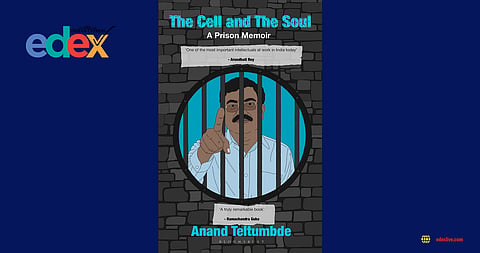

Anand Teltumbde had, perhaps, tried to be and do too much. A management professor and a former corporate CEO, he had tried to hold governments accountable over the caste system and be an advocate for Dalit rights.
Teltumbde is married to BR Ambedkar’s grandaughter. His brother was marked out as a Maoist; his activism, in the state’s perception of it, was not free of those optics. In 2020, along with other activists, he was arrested in connection with the 2018 Bhima Koregaon case; he was released on bail in 2022. A conversation with him on the recent publication of The Cell and the Soul (Bloomsbury), his part-prison memoir, part-prison diary.
What is The Cell and the Soul a record of, and why was it important for you to write this because so far you have been known as a writer engaged in Marxist analyses of Ambedkar’s legacy?
This book is a prison memoir in the long tradition of those written by political prisoners. It comprises 22 of the more than a hundred notes I wrote during my 31 months of incarceration. Like its predecessors, it goes beyond personal catharsis to offer glimpses of jail life — testimonies of humiliation, cruelty, and the high-handedness of the prison administration — alongside accounts of our resistance, reflections on systemic issues, and political communication. These notes were part of my survival strategy, written with the awareness that they might one day reach the public. During this period, I also wrote four books. Whatever notions exist about me, I see all my writings, including this one, as part of the larger struggle to make the world a slightly better place for all.
You write in the book of being “shocked” by your arrest. What were the illusions the court verdict and the jail terms broke for you?
I was stunned by the blatant falsehoods the Pune police presented in their first press conference that formed the basis of the charge against me. I was certain these would collapse in court. But as my plea for quashing the case was repeatedly rejected—courts accepting sealed envelopes from the prosecution—I was appalled by the process itself. Coming from a corporate and business school background as a teacher and practitioner of capitalism, I had never imagined that such a ludicrous charge of being a Maoist could stick. That illusion ended the day they actually arrested me.
In the book, you have taken issue with the Ambedkarites’ symbolism and their kind of ‘resistance’.
Ambedkarite symbolism has always pained me, for it diverts a powerful potential for change into the reactionary camp of the status quo. As in any social group, there are Ambedkarites who remain alive to reality—they protested my arrest, supported me in prison, and showed sparks of militancy.
From Operation Greenhunt to the Bhima Koregaon-Elgar Parishad case -- with you being one of the activists who was arrested for the latter -- is there anything common, in terms of activism and the state's response to it, between the two?
Operation Green Hunt was the state’s all-out offensive against the Naxalites, largely confined to the forests of Chhattisgarh. The Bhima Koregaon or Elgar Parishad case represents a new strategy—one aimed at terrorising dissenting voices across the country. What unites both is the absence of a clear definition of the target. In Operation Green Hunt, the label of ‘Naxalite’ was used to devastate innocent tribals; in the Elgar Parishad case, the newly coined oxymoron “urban Naxal” was deployed to criminalise anyone who stood up for democracy, the Constitution, and human rights.
One of the striking chapters of The Cell and the Soul is the one on your brother Milind. What is the kind of weight inside and outside jail that an activist’s family has to carry when a family member is called a Maoist?
It is an indescribable burden when the state brands an entire family as “Maoist” and casts its surveillance net around. Society looks on with suspicion. For years, my heart would skip a beat each time I heard of an encounter; one can only imagine what my family went through.
Where does your case stand now?
Nowhere. Six of us are still languishing in jail, now in their sixth to eighth year. The discharge petitions are still pending, and charges have not yet been framed. Only after that can the trial begin. The prosecution has listed 363 witnesses, ensuring the process will drag on for years.
[Article by Paramita Ghosh of The New Indian Express]
